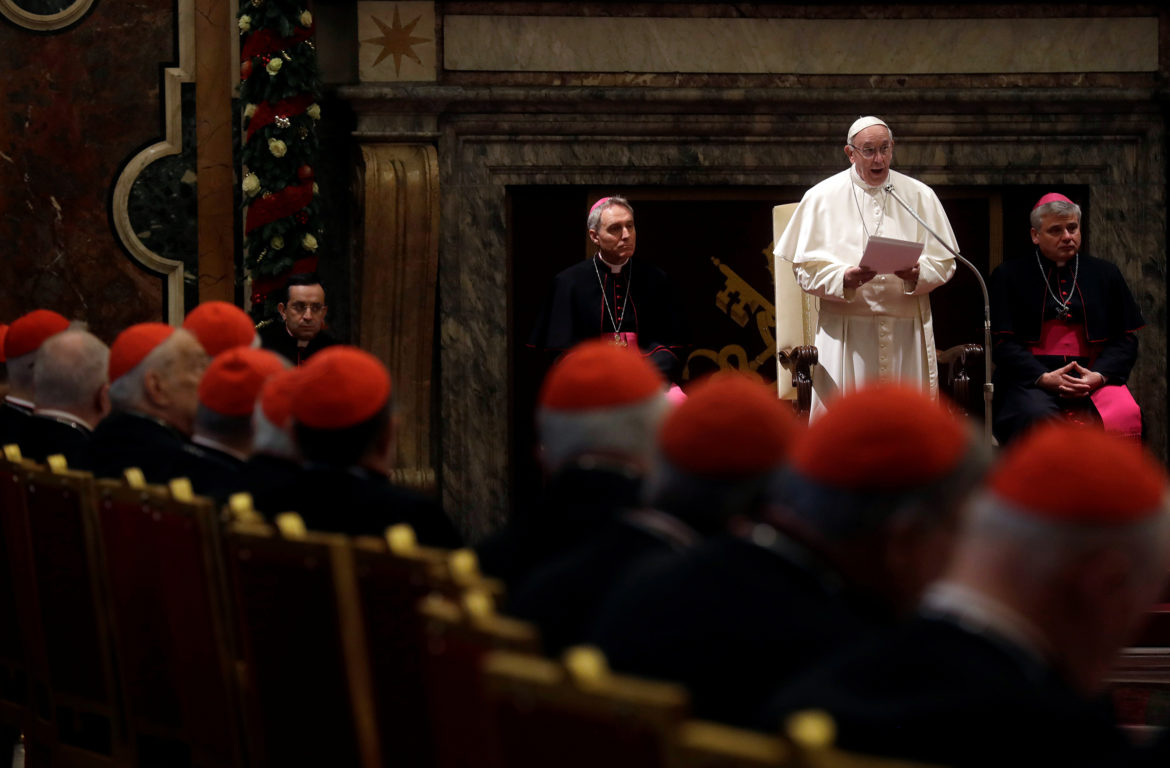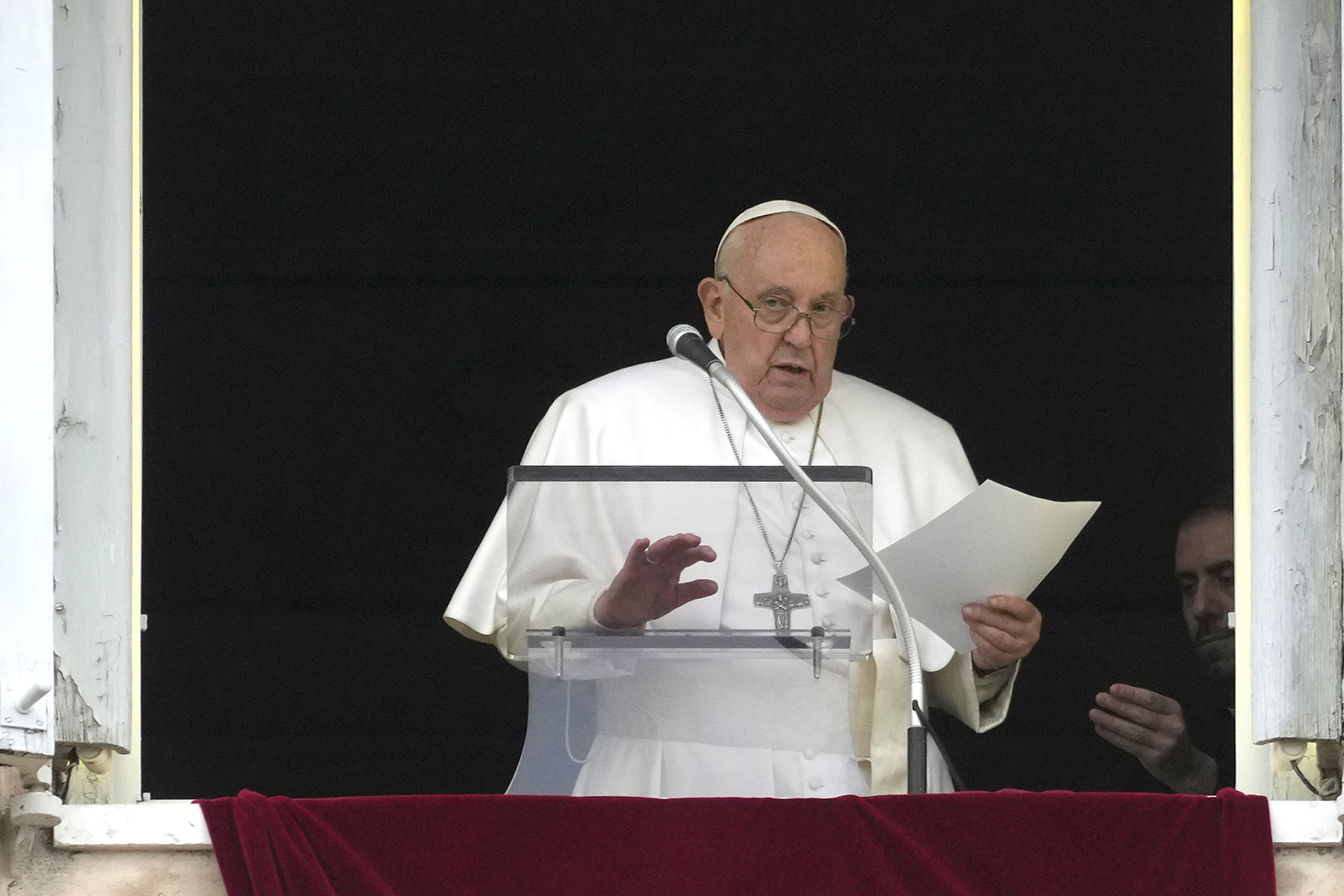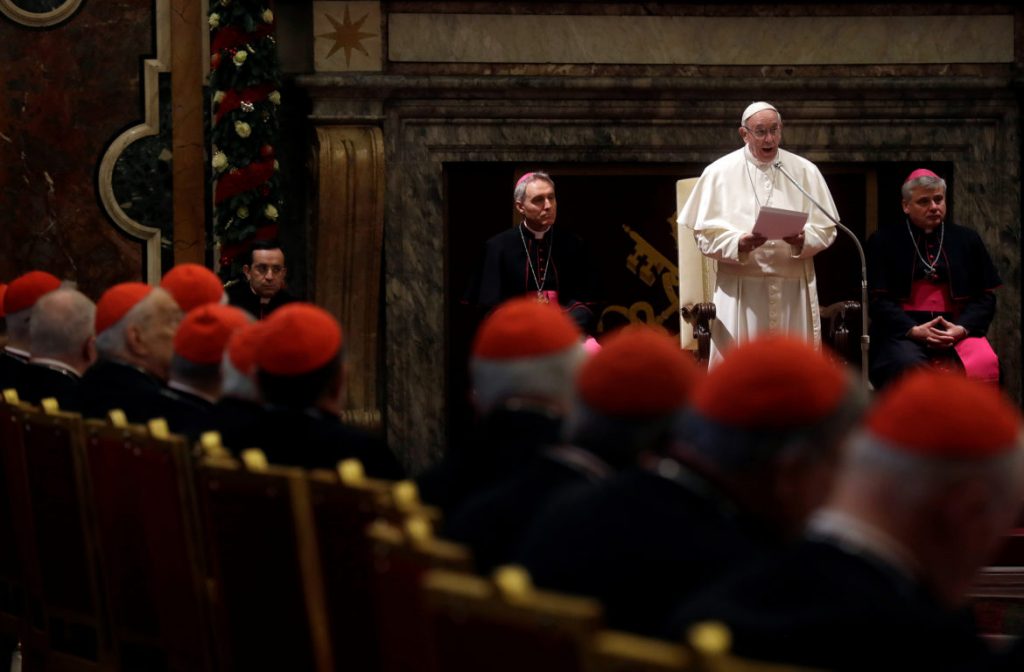
(RNS) — Pope Francis has nice things to say about almost everyone: LGBTQ Catholics, prisoners, prostitutes, migrants and sinners. The one group he regularly chastises is the clergy, frequently telling them not to act like princes, and instead to remember they are servants of the people of God.
He has modeled this by putting away jeweled crosses, ermine furs and red shoes and being pastoral rather than imperial in style.
Francis, however, still treats Vatican officials as princes. He rarely fires anyone, and even those he exiles he tends to have back for a meal, or to rehire. After all, it’s impossible to fire a prince.
Look at the British royalty. Although they refer to themselves as “the firm,” they are still a family. Prince Andrew was involved in scandals and is being kept out of the public eye, but he is still a prince. Prince Harry is playing hooky from his royal duties in California, but he is still a prince. You cannot be fired from a family.
Similarly, theology, canon law and tradition do not make firing cardinals and bishops easy.
We have seen this in the way Pope Francis is treating Archbishop Georg Gänswein, who was secretary to Pope Benedict XVI and head of the papal household. Francis kept him on in his latter role until it became evident he was working against the new pope. Finally, when Benedict died and Gänswein rushed into publication a “tell all” memoir that portrayed Benedict at odds with his successor, Francis sent him packing back to Germany.
In any other organization, this would be a no-brainer. The man was disloyal to Francis, had betrayed Benedict’s confidences and embarrassed the entire organization. Even so, some accused Francis of being mean because he did not give Gänswein another job. Because he is an archbishop, he must be given an archdiocese or another Vatican position, according to Francis’ critics.
Francis gave in and reportedly will appoint Gänswein as a nuncio or ambassador.
Pope Francis speaks during the traditional greetings to the Roman Curia in the Sala Clementina (Clementine Hall) of the Apostolic Palace, at the Vatican, on Dec. 22, 2016. (AP Photo/Gregorio Borgia, Pool)
This is not the first time Francis has given a job to a prelate simply to give him a job.
When the Pontifical Council Cor Unum was merged into the Dicastery for Promoting Integral Human Development, Cardinal Robert Sarah lost his job as head of Cor Unum, but in 2014 Francis made him head of the Dicastery for Divine Worship, a position for which he was totally unsuited. Recently, Francis acknowledged that this appointment was a mistake.
In describing organizations, sociologists distinguish between “Gemeinschaft” and “Gesellschaft,” categories developed by 19th-century German sociologists Ferdinand Tönnies and Max Weber. The terms are usually translated in English as “community” and “society,” respectively.
Included under Gemeinschaft would be the family and other traditional communities where personal relationships, values and roles are preeminent and in which the central focus is the people within the community.
In a Gesellschaft, impersonal rules, relationships and values are what matter. While the family is the purest form of Gemeinschaft, the modern corporation and state are examples of Gesellschaft. Their goal is to accomplish some purpose.
These, of course, are ideal types. Few organizations are purely one or the other, as can be seen by looking at the church. Certainly, it is predominantly a Gemeinschaft, a community, but it also attempts to achieve goals, as does a Gesellschaft, such as works of charity.

Pope Francis reads his message during the Angelus noon prayer from the window of his studio overlooking St. Peter’s Square, at the Vatican, March 10, 2024. (AP Photo/Alessandra Tarantino)
Different parts of the church are more one way or the other. Parishes tend to fall under Gemeinschaft, communities. Catholic charities and hospitals are considered Gesellschaft. Religious orders are both, with the more apostolic orders having to operate more like Gesellschafts.
I would argue that bureaucracies in the church, such as chanceries and the Vatican Curia, need to recognize that they are Gesellschafts in service of the Gemeinschaft. When a chancery keeps an incompetent person on staff because it sees itself as a community, it fails the wider church community by providing poor service.
This happens too frequently in the Vatican Curia. When a new pope comes in, he is stuck with the staff appointed by his predecessor. This would be unthinkable in any other organization. It took John Paul II seven years to replace all the top officials in the Vatican. Francis kept some officials even longer — consider Cardinal Marc Ouellet, who was allowed to remain as head of the office in charge of nominating bishops until last year, 10 years into Francis’ pontificate. If we don’t have more “Francis bishops” in the church, that’s why.
Vatican labor practices, which are modeled on Italian law, make it more difficult to fire a layperson in the Vatican than in the United States. But firing a cardinal or bishop is also difficult because they are seen as part of a papal court of princes and nobles. They are part of the pope’s family.
Rather than firing people, Francis, like a good parent, calls them to conversion, but this can put the good of the staff over the good of the people they are supposed to serve.
The Vatican Curia needs to be pulled into the 19th century of Tönnies and Weber, when royal courts gave way to modern bureaucracies as instruments of governance.
The only way to kill the papal court is to stop making Vatican officials into bishops and cardinals. If the top officials are priests and laypeople, they can be removed without the necessity of finding them another high position in the church. Priests can be told to return to their dioceses for assignment by their bishop. Laypeople can apply for other positions in the church or society just like any other person who loses a job.
No matter what he says to them, Francis is still treating Vatican officials like princes. Until that changes, all other curial reforms will have little impact.

